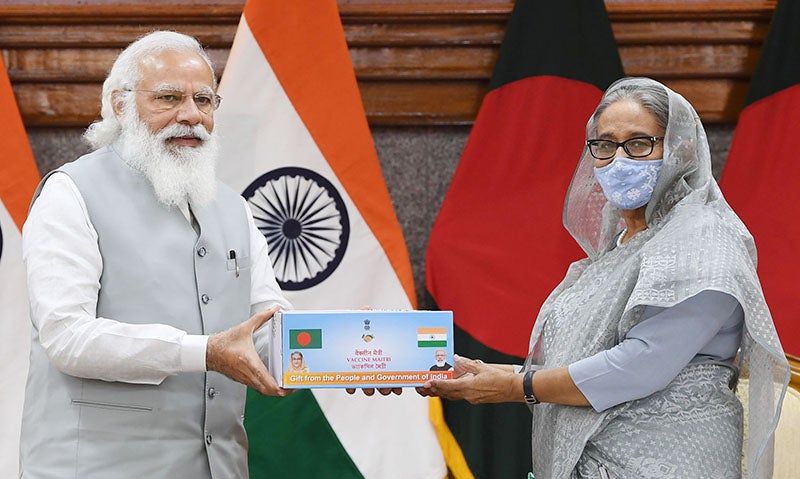Prime Minister Modi Visits Dhaka: Enhancing Bangladesh-India Ties
Kunthavi Kalachelvam, Wini Fred Gurung, Mohammad Masudur Rahman
5 April 2021Summary
Bangladesh and India have made significant progress in their relationship in the last few years. However, Prime Minister Narendra Modi’s recent visit to Dhaka also highlighted the existing tensions in the relationship. Both sides need to work towards resolving their outstanding issues, especially the Teesta water sharing agreement, which is vital to strengthening the bilateral partnership.
India’s Prime Minister Narendra Modi visited Bangladesh on 26 and 27 March 2021 to commemorate the 50th year of the independence of Bangladesh and birth centenary of Bangabandhu Sheikh Mujibur Rahman. During the visit, he and Bangladesh’s Prime Minister Sheikh Hasina also discussed ways to deepen economic and cultural collaboration.
The India-Bangladesh relationship has seen steady growth in the last decade, especially under Hasina’s leadership. Due to her consecutive victories in the elections from 2014 to 2018, the bilateral relationship has seen consistency and increased cooperation. There are more than 50 bilateral institutional mechanisms between India and Bangladesh in “security, trade & commerce, power & energy, transport & connectivity, science and technology, defence, rivers & maritime affairs etc.” Both sides are active in various regional and subregional groups like the Bay of Bengal Initiative for Multi-Sectoral Technical and Economic Cooperation and the Bangladesh, Bhutan, India and Nepal Initiative.
Bangladesh has become a trusted partner to its South Asian neighbours. It has allowed Nepal and Bhutan the use of its air space and seaport facilities, thus emerging as a South Asian gateway. It has also offered transhipment and all-around connectivity to India. A key pivotal point that strengthened the relationship was the ratification of the Land Boundary Agreement by the Indian parliament in 2015, which brought closure to the numerous land boundary disputes experienced by both sides. In 2019, Modi stated that their bilateral relationship was in its “golden era (sonali adhyay)”.
The recent visit served as an excellent platform for the two prime ministers to review the bilateral relationship and further bolster their ties. In the joint statement, Modi congratulated Bangladesh on its “outstanding achievements in human development, poverty alleviation, counter-terrorism and remarkable economic progress made under the dynamic leadership of Prime Minister Sheikh Hasina.” A possible area of innovative collaboration between Delhi and Dhaka could be in space and satellite research following the launch of Bangladesh’s first satellite Bangabandhu Satellite (BS-1) in 2017. The COVID-19 outbreak also provides the opportunity to boost public health partnership. Bangladesh highlighted that the partnership should focus on “training, capacity building, and technology transfer.” Bangladesh also pointed to biosecurity as an area in which both sides could cooperate. The COVID-19 pandemic showed that a lack of biosecurity measures could lead to an economic downfall exacerbated by the two countries’ interdependent nature. Modi gifted 1.2 million AstraZeneca vaccines to Bangladesh at the end of his visit, signalling a positive trajectory in this area of development. Various bilateral documents were signed during the visit, including memorandums of understanding on Cooperation in the Field of Disaster Management, Resilience and Mitigation, and on the Establishment of a Framework of Cooperation in the Area of Trade Remedial Measures between Bangladesh and India.
In spite of the positives, several issues have significantly affected Indo-Bangladeshi relationship and remain to be resolved. They are water sharing, India’s Citizenship Amendment Act (CAA), 2019, and the Citizenship (Registration of Citizens and Issue of National Identity Cards) Rules, 2003.
The sharing of the Teesta River has consistently been a point of contention between the two countries. The river flows from the Indian states of Sikkim and West Bengal before travelling to Bangladesh. Being the downward stream country, Bangladesh has expressed concerns about a significant decrease in water levels and, therefore, wants India to increase its share. Despite several rounds of discussions through the India-Bangladesh Joint River Commission, the two countries have been unable to reach a final agreement due to opposition from West Bengal’s Chief Minister Mamata Banerjee.
In 2019, the Modi government passed the CAA. The passing of this act and the government’s aim to implement the National Register of Citizens in all its states are major concerns for Bangladesh. It already hosts a large number of Rohingya refugees from Myanmar. An influx of people from India could severely harm the country’s economy and environment.
Tensions in Bangladesh have also been rising domestically with Bangladeshis accusing Modi and his government of purportedly inciting religious tensions and anti-Muslim violence in India. In response to Modi’s visit, protests took place across the country, especially in Hathazari in the Chittagong district where at least 10 people were reported dead and dozens injured after the protestors clashed with the police.
Bangladesh has also been struggling to balance its relationship with China and India. China is Bangladesh’s top trading and investment partner while India is its second largest trading partner. Dhaka aims to attract foreign investments but it fears China and India using investments to exert influence in their neighbourhood. Late last year, Bangladesh called off the development of the Sonadia Island deep-sea port with China, a victim of geopolitical competition in the Bay of Bengal.
India-Bangladesh relationship has come a long way and has a promising future. However, the two sides will need to address several deep-rooted issues in order to reap the fruits of the recent upturn in their ties.
. . . . .
Ms Kunthavi Kalaichelvam is a Research Trainee at the Institute of South Asian Studies (ISAS), an autonomous research institute at the National University of Singapore. She can be contacted at kunthavi@nus.edu.sg. Ms Wini Fred Gurung is a Research Analyst and Dr Masudur Rahman is a Visiting Research Fellow at the same institute. They can be contacted at wini@nus.edu.sg and masudrahman@nus.edu.sg respectively. The authors bear full responsibility for the facts cited and opinions expressed in this paper.
Photo credit: pib.gov.in.
-
 More From :
More From :
-
 Tags :
Tags :
-
 Download PDF
Download PDF



